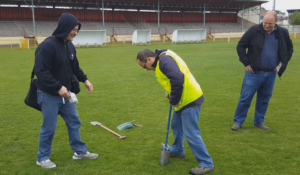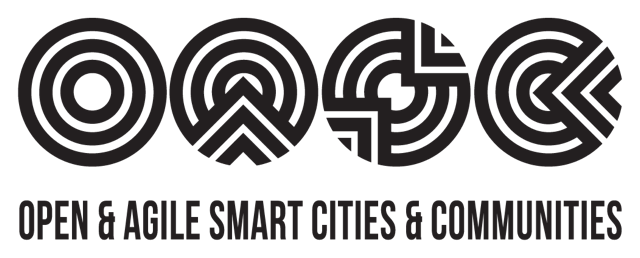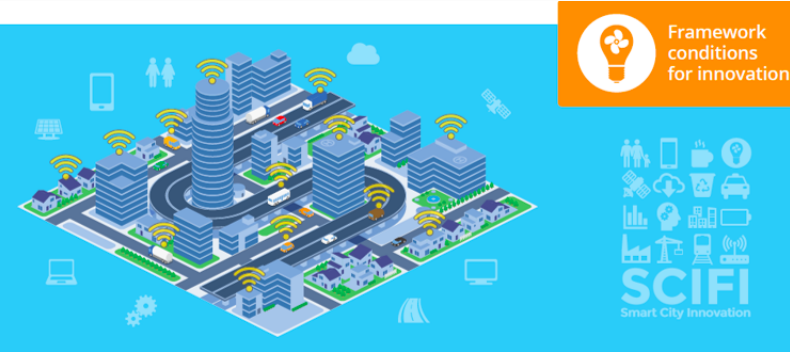Saint-Quentin, a city of around 56.000 inhabitants in the north of France, is exploring new ways to improve public services in the framework of the Interreg 2seas project SCIFI. Together with the three cities Bruges, Mechelen (BE) and Delft (NL), Saint-Quentin is specifically aiming to create value and better services for mid-sized cities and their citizens. To achieve this objective, the city applies innovative public procurement procedures, implements interoperable solutions and an open data platform, and opens up data.
New Solutions Based on City Challenges
In 2018, SCIFI has launched seven challenges in the field of energy, environment and mobility. After a successful open call, the selected start-ups and SMEs have implemented their solution in the beginning of 2019 and have since then been testing their solution in the SCIFI partner cities .
Before launching the challenges, Saint-Quentin consulted with its citizens in four workshops to better understand their concerns. The two main concern of citizens have proved to be the environment and the waste of resources.
After including its citizens’ concerns as main challenges for the open call, the city kept all stakeholders involved in the various stages of the pilot roll-out. While this has been a challenging approach for both the solution provider and the city, the city considers this inclusion of all stakeholders as crucial to assure that the piloted solution can scale up of a successful testing phase within the SCIFI project
Saving Water based on Data
One of Saint-Quentin’s challenges is optimise the use of water for parks and sport fields. Stéphane Siméon is responsible for the green spaces of the city of Saint-Quentin. His concern is to optimise the water consumption on sport fields and at the same time to minimise the necessary interventions of his staff.
Currently, the watering of Saint-Quentin is done based on local knowledge, intuition and routine procedures. However, the use of factual data, like soil humidity, water penetration level, temperature, wind (direction and force), local weather forecasts and water consumption, this watering process and monitoring can be significantly improved. Other context also needs to be taken into account, for example upcoming sport events and the mowing schedule of the robot mower.
Alexandre Chaffotte, Innovation Manager of the City of Saint-Quentin, says: “The data is mostly available to improve the watering process, but the main challenge is to aggregate and analyse the data as they all come in different standards and often lack relevant context information, for example when and where data was recorded.”
To make data meaningful and to improve water management in Saint-Quentin, the city therefore needs a decision support system that is interoperable with its existing infrastructure – the irrigation system and mowing robot.
Saving Water – With a Solution Developed by a Saint-Quentin Start-up
This challenge is now being tackled by Element IO, a young innovative company grown and based in Saint-Quentin. Element IO is providing an integrated solution based on interoperable devices, such as sensors and valve controller, and open data mashup to deliver a monitoring application for Saint-Quentin’s green space department.
Read more: Functionalities of Element IO
By design, Element IO offers the possibility to its customers to set up simple mashup rules to combine available sources of informations such as open data about green fields locations, common usage, occupation calendars, weather stations and others with the information generated by the Element IO devices installed on the green fields.
The first set of Element IO devices – the sensors – publish information about the soil and air conditions (humidity, air pressure, sunshine) as open data without being intrusive nor stressful for the grass. These data are aggregated through the Element IO platform in order to provide decision making tools. The appropriate quantity of water and ideal time slot are sent to the second set of Element IO devices – the watering controllers – to trigger the watering at the right moment in the right quantity and on the right spot (12 sensors and actuators per football field).


Alexandre Chaffotte says: “We have to make sure that the solution developed by Element IO is interoperable with the already existing infrastructure. To ensure this the project has to evaluate existing standard data models and open communication protocols (APIs). This is crucial to guarantee interoperability for a sustainable deployment of such a solution.”
To support the City of Saint-Quentin and Element IO to address interoperability and scalability challenges, the local FIWARE iHub operated by SCIFI partner Faubourg Numérique has been involved – not only as business facilitator but also as technology services provider.
The iHub helped to integrate the OASC Minimal Interoperability Mechanisms around the Context Broker CEF building block and a FIWARE IoT back-end architecture. An important part of the technical tasks has been to select, adapt and integrate the data models to virtualise the physical entities and their dynamic relationships based on existing and harmonised data models (provided by FIWARE DM and schema.org global communities, among others).
In the coming months, the learnings and technical deliverables from this local implementation will be globally shared by the City of Saint-Quentin and Faubourg Numérique as a contribution to the SCIFI project and to the Front-Runner Smart City Program jointly launched by TM Forum and the FIWARE Foundation, and supported by Open & Agile Smart Cities
More about SCIFI
Smart Cities Innovation Framework Implementation (SCIFI) is an Interreg 2Seas-funded open innovation accelerator programme bringing together citizens and public sector organisations that have specific challenges and/or open data with startups, companies and students that have innovative solutions with data for these challenges.
SCIFI enables medium-sized cities to create a proof of concept that opening their data will create value and better services for their city and citizens. On the other hand, SCIFI enables startups, companies and students to work directly with cities to develop data-driven solutions for cities and to scale their products and solutions more easily thanks to the use of open data standards.
It is centred around an accelerator programme that facilitates joint and innovative cross-border procurement. The next open calls launches on 1 July 2019. More information is available here.
SCIFI is funded by Interreg 2 Seas 2014-2020, a European Territorial Cooperation Programme covering England, France, the Netherlands and Belgium (Flanders) and is being delivered by the cities of Mechelen, Delft, Bruges, Saint-Quentin, Agoria, Faubourg Numérique, Cambridge Cleantech and University of Southampton.
Do you want to know more about this project or pilot? Contact Alexandre Chaffotte, Saint-Quentin (alexandre.chaffotte@saint-quentin.fr)

